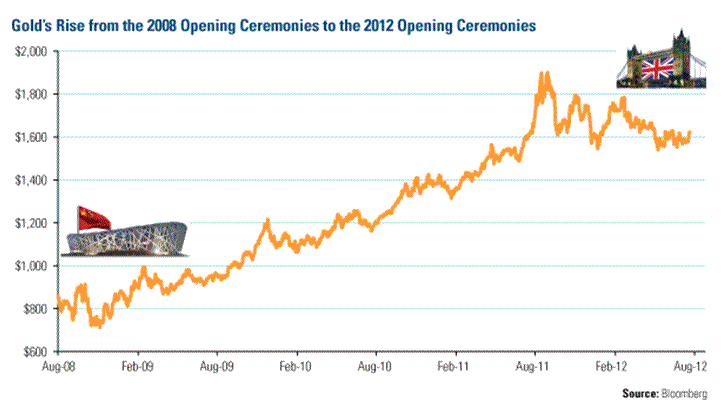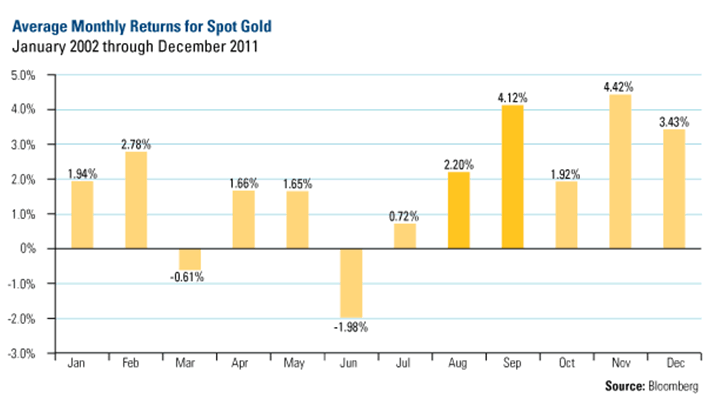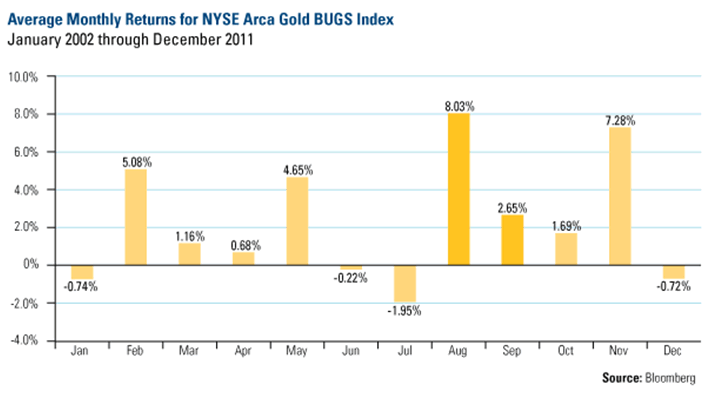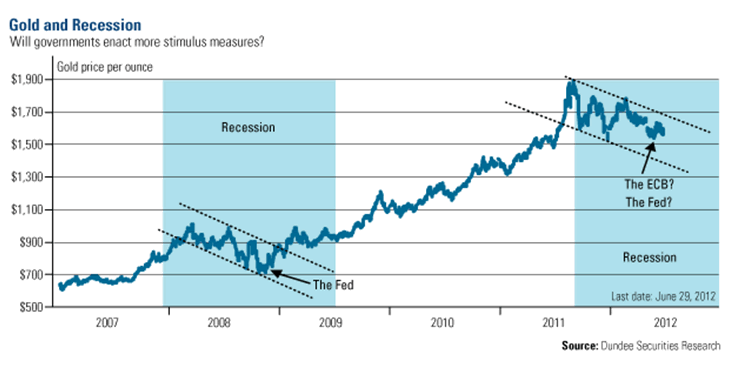Which Way Will the Pendulum Swing for Gold?
Commodities / Gold and Silver 2012 Aug 14, 2012 - 03:40 AM GMTBy: Frank_Holmes
 One of the most fascinating aspects when watching a sporting event like the Olympics is the historical statistics highlighting the tremendous advances in athleticism over the years. In the spirit of the events this summer, BTN Research compared gold's advancement from the beginning of the games in Beijing to the London Olympics.
One of the most fascinating aspects when watching a sporting event like the Olympics is the historical statistics highlighting the tremendous advances in athleticism over the years. In the spirit of the events this summer, BTN Research compared gold's advancement from the beginning of the games in Beijing to the London Olympics.
On the day of China's auspicious opening ceremonies on August 8, 2008, gold was $857.80 an ounce. By the time the world watched the opening ceremonies of the 2012 London Summer Olympic Games, the precious metal had climbed to $1,617.90 an ounce. This represents a remarkable increase of 89 percent in four years.

Athletes are often asked if they can keep improving their outstanding performance; I'm asked if gold can continue climbing. As I like to remind investors, gold isn't always on an upward path. When looking at the average monthly returns over the past decade, you can see that short-term setbacks are normal throughout the year. The yellow metal has historically declined in value in March and June; gold stocks see much greater fluctuations from month-to-month.
So while gold has its monthly ups and downs, you can see that, on a historical basis, we have arrived at gold's peak performance period of the year. Based on 10 years of data, gold bullion has historically increased 2 percent in August and 4 percent in September.

Gold stocks, as measured by the NYSE Arca Gold BUGS Index (HUI), have historically performed even better in these two months. Over the past 10 years, gold companies have climbed 8 percent and almost 3 percent in August and September, respectively.

Since the beginning of August, gold and gold stocks are already following their historical pattern, as we've seen just a hint of an increase in the price of gold, but a significant bounce in gold companies.
Spot gold has only climbed 0.4 percent, compared to the HUI, which has increased about 5 percent since August 1. This boost in gold stocks helps to close the gap between gold companies and their underlying commodity, as I discussed last week. I indicated that the disparities meant that the cheapest resources are not found in the ground--they're listed.
Since then, it was announced that Endeavor Mining would purchase Canada's Avion Gold Corporation in an effort to consolidate the West African gold space. This acquisition represented a 56.4 percent premium to the trading day prior to the announcement and illustrates how extremely undervalued gold companies have been.
"Beaten-down gold stocks are an incredible fundamental bargain," says Adam Hamilton from Zeal Intelligence. His research indicates that gold companies are "super-cheap" relative to not only the price of gold, but also on a price-to-earnings basis. When he weighted the price-to-earnings ratios of the stocks in the HUI by market capitalization, he found that gold stocks are at the lowest levels than they have been during gold's entire bull market. Gold companies are also cheaper than the overall stock market, as "a dollar of gold-stock profits costs investors $12, but the same dollar is going for $18 in the general markets," according to Zeal's research.
Hamilton says, "Like the rest of the markets, sentiment flows and ebbs in the gold stocks. Sometimes investors love them and bid them up to dizzying heights as greed reigns. But then the great sentiment pendulum starts swinging towards the opposite extreme of fear. And gold stocks are crushed to ridiculous unsustainable lows like we saw last month. Realize neither excessive greed nor excessive fear can persist for long."
There is a caveat for gold stock investors in the short-term, though. As Investor Alert readers know, I frequently look at presidential cycle trends to determine where stocks may be heading. From 1984 through 2008, the performance of the Philadelphia Stock Exchange Gold and Silver Index (XAU) has historically been weak during the year of a presidential election. The silver lining is that the year following the election, the XAU has historically bounced back.
So which way will the pendulum swing this fall for gold and gold stocks? The market may wait to see the policy actions by the Federal Reserve and the European Central Bank. Credit Suisse thinks it will likely "be critical in determining the path of the U.S. dollar and equities, and by association, gold."

If the market sees progress on structural and fiscal reforms from Europe and additional easing from the Fed, these actions would have the "potential to be powerfully bullish for equities" and might "drive renewed investor enthusiasm for gold that could see the metal trade up to and beyond the $1,700 mark," says Credit Suisse.
For more updates on global investing from Frank and the rest of the U.S. Global Investors team, follow us on Twitter at www.twitter.com/USFunds or like us on Facebook at www.facebook.com/USFunds. You can also watch exclusive videos on what our research overseas has turned up on our YouTube channel at www.youtube.com/USFunds.
By Frank Holmes
CEO and Chief Investment Officer
U.S. Global Investors
U.S. Global Investors, Inc. is an investment management firm specializing in gold, natural resources, emerging markets and global infrastructure opportunities around the world. The company, headquartered in San Antonio, Texas, manages 13 no-load mutual funds in the U.S. Global Investors fund family, as well as funds for international clients.
All opinions expressed and data provided are subject to change without notice. Some of these opinions may not be appropriate to every investor.
Standard deviation is a measure of the dispersion of a set of data from its mean. The more spread apart the data, the higher the deviation. Standard deviation is also known as historical volatility. All opinions expressed and data provided are subject to change without notice. Some of these opinions may not be appropriate to every investor. The S&P 500 Stock Index is a widely recognized capitalization-weighted index of 500 common stock prices in U.S. companies. The NYSE Arca Gold BUGS (Basket of Unhedged Gold Stocks) Index (HUI) is a modified equal dollar weighted index of companies involved in gold mining. The HUI Index was designed to provide significant exposure to near term movements in gold prices by including companies that do not hedge their gold production beyond 1.5 years. The MSCI Emerging Markets Index is a free float-adjusted market capitalization index that is designed to measure equity market performance in the global emerging markets. The U.S. Trade Weighted Dollar Index provides a general indication of the international value of the U.S. dollar.
Frank Holmes Archive |
© 2005-2022 http://www.MarketOracle.co.uk - The Market Oracle is a FREE Daily Financial Markets Analysis & Forecasting online publication.



